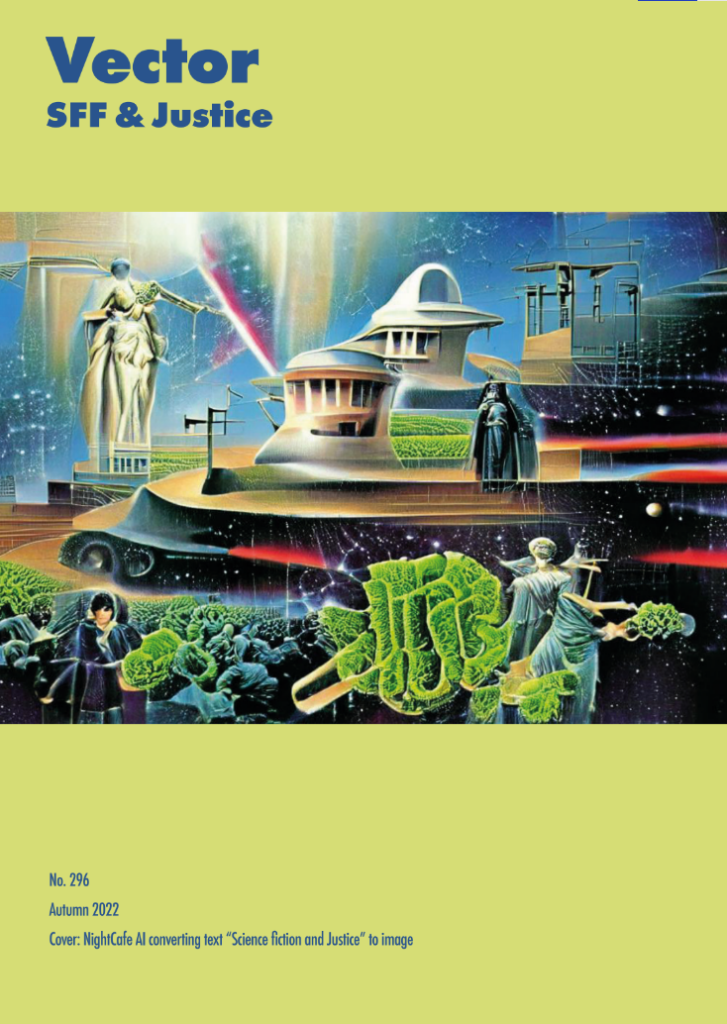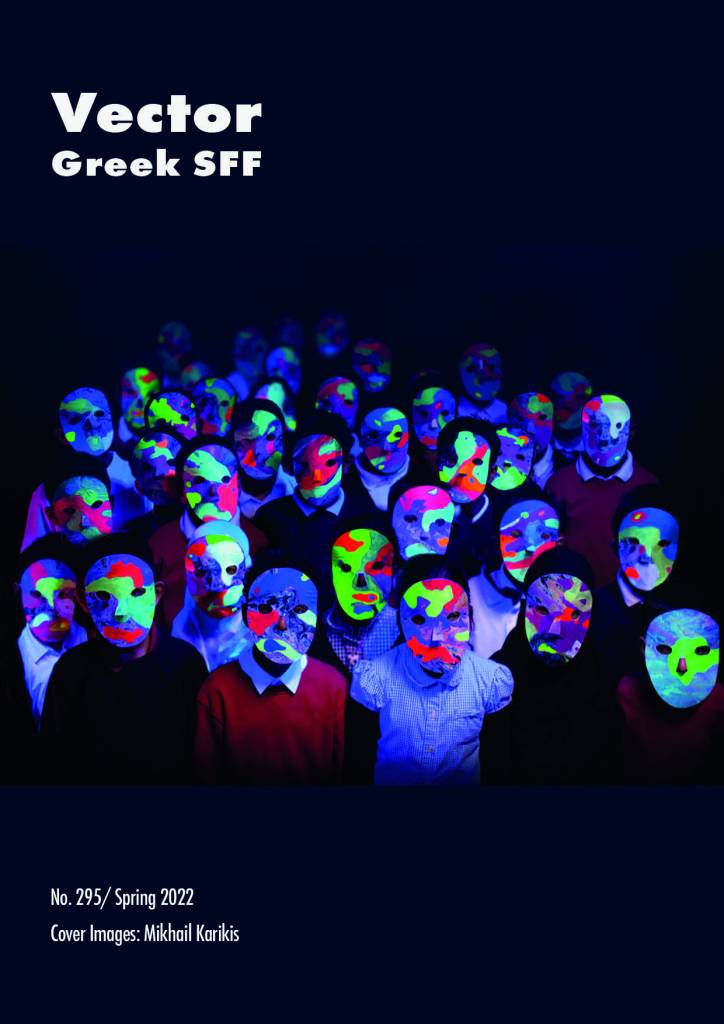To subscribe to Vector in print, join the BSFA. Members can also access digital editions of all recent issues.
Vector 299 (April 2024)
Guest edited by Paul March-Russell. With contributions by Angela Acosta, Nick Hubble, Paul Kincaid, Nina Allan, Andrew M. Butler and a new regular column by Kat Kourbeti. Includes an interview with Kim Stanley Robinson by Henry Farrell, book reviews, and a tribute to Christopher Priest by Paul March-Russell.
Cover art by James Gillham.
Vector 298 (Nov 2023)
As the guest editors Stewart Baker and Phoenix Alexander write in their editorial:
The articles in this issue of Vector work in both directions, teasing out the ways archives and libraries can be informed by SFF works while also exploring the assumptions SFF works make about libraries and archives.
In “The Librarian, The Computer, The Android, and Big Data,” Nichole Nomura and Quinn Dombrowski ask the question of whether librarians exist in the future of Star Trek—certainly a topic of relevance to today’s “AI search” upheavals. In “The Queen a Librarian Dreams of,” Kathryn Yelinek examines the connection between information literacy and restorative justice in the fantasy world of Kristin Cashore’s Bitterblue.
Next up are a pair of trips through fictional archives. In “Archives, Information, and Fandom,” Tom Ue and James Munday consider how the Halliday Journals from the world of Ready Player One present the impacts of (mis)direction and information surplus on researchers. Grace Catherine Greiner’s “Finding Nothing Can be Finding Something” explores the capital-A Archives in Patrick Rothfuss’s Kingkiller Chronicles, with its interest in medievalisms, access, and “simultaneous bookishness and orality.”
Hopping back to libraries, Guangzhou Lyu’s “Library of Disassembled Past” takes a look at a floating library in China Mieville’s The Scar, exploring how libraries can serve as places of “deterritorialisation and reterritorialisation.” In “Magic and Critical Librarianship,” Ellie Campbell interrogates the ways libraries and other memory institutions can institutionalise racism, colonialism, misogyny, and homophobia, as shown in three fantasy short stories. And the last article in the issue, Monica Evans’s “You Are the Library,”considers how digital games can engage players in “library-like mechanics,” drawing on the long history of the value of information and exploration in game design.
Whether you’re a librarian thinking about installing a science fiction reading room, a fantasy novelist looking for worldbuilding nuggets for your next doorstopper about nautical librarians, a SFF academic who’s intrigued by archives concepts in games, or just someone who’s stopped by the information desk of this editorial to ask where the metaphorical toilets are, we hope you’ll enjoy your time with the insightful explorations of libraries, archives, and the future of information that make up this issue of Vector!
Cover by Kalina Winska. Original artwork title: The ethereal and eternal contest, with no winners and no losers, occasional bursts of anger, frustration, and perhaps…shame; waves of humility are often too weak to reach the edge of the world. (graphite, acrylic paint, gouache, and ink on wood panel, 36 x 48 inches, 2020).
Vector 297 (2023)
The ‘Futures’ issue of Vector is a collaboration between the British Science Fiction Association and the Institute for Development Studies, guest-edited by Stephen Oram. Our biggest issue to date, it explores how the opportunities, risks and limitations of harnessing science fiction all depend on who is applying it and how. Vector: Futures is a treasure trove of projects that aim to use science fiction to change the real world, showcasing interventions from fields as diverse as statistics, military intelligence, social activism, climate policy, decision science, technology and art.
Several pieces consider milestones for artificial intelligence and creativity, including SF writer Fiona Moore interviewing AI scientist Hod Lipson, and AI scientist Mackenzie Jorgensen interviewing SF writer Eli Lee, while Paul March-Russell and Dilman Dila both reflect on positive examples of AI/artist collaborations. Other interviewees include Andrew Merrie and Pat Keys, two of the leaders of the Radical Ocean Futures project, and Shanice Da Costa, art director for UNHCR’s Innovation Service’s Project Unsung. Interventions by SF writers in environment, science and policy domains are the subject of several articles, including those by Allen Stroud, Emma Johanna Puranen, Benjamin Greenaway, Dillon & Craig, Finch & Mahon, Fredström et al. and Pereira et al. Sara Stoudt reflects on statistics as a kind of science fictional thinking. Articles by Seeger and Davison-Vecchione and by Will Slocombe gives the issue’s theme a further twist, exploring science fictional representations of forecasting and prediction, and how science fiction itself might shape our applied science fiction imaginaries. Vector: Futures also features regular BSFA favourites, including Kincaid in Short, and Vector Recommends (selections from The BSFA Review).
The editorial, ‘Torque Control: Apply Science Fiction Here’ scopes the ground for this issue, and for applied science fiction as a whole. Whether you’re a longtime science fiction fan or writer, or a policymaker, practitioner, researcher or organiser interested in the power of arts and culture, there should be something in this issue for you.
Vector 296 (2022)

Vector 296, SFF & Justice, is guest edited by Stewart Hotston. Arriving November 2022. Featuring Stewart Hotston’s guest editorial on SF and justice, reviews by Arike Oke, Geoff Ryman, Phil Nicholls, Andy Sawyer, and Maureen Kincaid Speller from The BSFA Review, an interview plus article from Gautum Bhatia, interview plus book excerpt from Roman Krznaric, Yudhanjaya Wijeratne interviewed, BSFA Diversity Officer Ali Baker interviewed, Jo Lindsay Walton on art and artificial intelligence, Áron Domokos on the representation of the Roma in Hungarian SFF, Charne Lavery, Laura Pereira, Bwalya Chibwe, Nedine Moonsamy, Chinelo Onwaulu, and Naomi Terry on the use of Africanfuturist SF in rethinking how we value and care for nature, Guangzhao Lyu reporting on this year’s Science Fiction Research Association’s Futures from the Margins conference in Oslo, and a tribute to Maureen Kincaid Speller.
Vector 295 (2022)

Vector 295, Greek SFF, is guest edited by Phoenix Alexander. Arriving April 2022. Featuring interviews with Nick Mamatas, Yanis Varoufakis, Polis Loizou, Mikhail Karikis and Alexis Panayiotou and contributions by Christos Callow Jr, Dimitra Nikolaidou, Paul Kincaid, Vasso Christou and others.
Cover by Mikhail Karikis.
Future issues:
Would you like to contribute to future issues of Vector? Visit our Submit page and keep an eye out for the call for submissions, or get in touch with an informal query.
Back issues:
An index of back issues of Vector can be found at the ISFDB. For availability of individual print issues, please contact us. A couple of issues (e.g. on African SF and on Speculative Economics) are available for purchase.
Many earlier issues of Vector are also available for download on this site, or through FANAC. Digital editions of more recent issues are available to BSFA members.
To subscribe to Vector, join the British Science Fiction Association. Membership is open to anyone in the world. Members receive Vector, FOCUS, the BSFA Review, special one-off publications, and other benefits. The BSFA is a nonprofit organisation, entirely run by volunteers.


